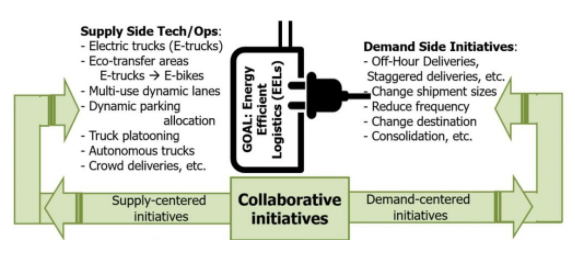The project “Collaborative Approaches to Foster Energy-Efficient Logistics in the Albany – New York City Corridor” is funded by the Department of Energy (DoE). It is done in collaboration with Argonne National Laboratory and George Mason University. The main goals of the project are:
Foster the adoption of Energy Efficient Logistics (EEL) along supply chains
Develop collaborative approaches between shippers, carriers and receivers
Induce carriers to incorporate energy efficient Technologies and Operations (Tech/Ops) and induce receivers to modify their demand patterns to exploit synergies with Tech/Ops
Develop analytical tools to estimate impact of EEL initiatives
Gain insight into ways to induce behavioral changes in the participants of supply chains
Foster the transformation of supply chains

At the current status of the project, the following tasks are either in progress or have been completed:
A new energy-efficiency framework tailored for freight transportation was developed, and a catalog of initiatives to foster energy-efficient logistics was produced.
A behavioral microsimulation (BMS) that models freight activity and supply chain’s interactions to assess the effectiveness of EEL initiatives is in progress.
A traffic simulation to assess the impacts of changing working hours of a port on the fuel consumption of all vehicles in the area of the port was produced.
Archival GPS data was acquired to estimate baseline conditions of emissions and fuel consumption in the Albany-New York City corridor.
A multi-method qualitative/quantitative approach compounded of in-depth interviews, behavioral surveys and behavioral modelling is being developed to identify which are the freight management strategies are most likely to be used by receivers, receivers and carriers.
Surveys to households were implemented to gain insight on consumers’ perception of management strategies to make e-commerce deliveries more energy efficient.
For detailed information about the tasks of the project click on the following links:
Catalog of Initiatives and Energy-Efficiency Framework
Behavioral Microsimulation (BMS)
Port Simulation
Baseline Conditions of Emissions and Fuel Consumption
Behavioral Modeling
